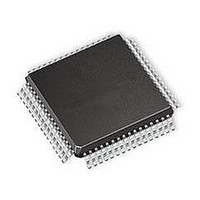PIC16F1527-E/MR Microchip Technology, PIC16F1527-E/MR Datasheet - Page 262

PIC16F1527-E/MR
Manufacturer Part Number
PIC16F1527-E/MR
Description
64-pin, 28KB Flash, 1536B RAM, 10-bit ADC, 10xCCP, 2xSPI, 2xMI2C, 2xEUSART, 2.3V
Manufacturer
Microchip Technology
Series
PIC® XLP™ 16Fr
Datasheet
1.PIC16F1526-EMR.pdf
(354 pages)
Specifications of PIC16F1527-E/MR
Core Processor
PIC
Core Size
8-Bit
Speed
20MHz
Connectivity
I²C, LIN, SPI, UART/USART
Peripherals
Brown-out Detect/Reset, POR, PWM, WDT
Number Of I /o
54
Program Memory Size
28KB (16K x 14)
Program Memory Type
FLASH
Eeprom Size
-
Ram Size
1.5K x 8
Voltage - Supply (vcc/vdd)
2.3 V ~ 5.5 V
Data Converters
A/D 30x10b
Oscillator Type
Internal
Operating Temperature
-40°C ~ 125°C
Package / Case
64-VFQFN Exposed Pad
Core
PIC
Processor Series
PIC16F
Data Bus Width
8 bit
Maximum Clock Frequency
20 MHz
Data Ram Size
1536 B
Number Of Programmable I/os
54
Operating Supply Voltage
2.3 V to 5.5 V
Mounting Style
SMD/SMT
Interface Type
SPI, I2C
Lead Free Status / Rohs Status
Lead free / RoHS Compliant
- Current page: 262 of 354
- Download datasheet (3Mb)
PIC16(L)F1526/27
22.1.2.9
1.
2.
3.
4.
5.
6.
7.
8.
9.
10. Get the received 8 Least Significant data bits
11. If an overrun occurred, clear the OERR flag by
DS41458B-page 262
Initialize the SPxBRGH:SPxBRGL register pair
and the BRGH and BRG16 bits to achieve the
desired baud rate (see
Baud Rate Generator (BRG)”
Set the RXx/DTx and TXx/CKx TRIS controls to
‘1’.
Enable the serial port by setting the SPEN bit
and the RXx/DTx pin TRIS bit. The SYNC bit
must be clear for asynchronous operation.
If interrupts are desired, set the RCxIE interrupt
enable bit and set the GIE and PEIE bits of the
INTCON register.
If 9-bit reception is desired, set the RX9 bit.
Set the DTRXP if inverted receive polarity is
desired.
Enable reception by setting the CREN bit.
The RCxIF interrupt flag bit will be set when a
character is transferred from the RSR to the
receive buffer. An interrupt will be generated if
the RCxIE interrupt enable bit was also set.
Read the RCxSTA register to get the error flags
and, if 9-bit data reception is enabled, the ninth
data bit.
from the receive buffer by reading the RCxREG
register.
clearing the CREN receiver enable bit.
Asynchronous Reception Set-up:
Section 22.4 “EUSART
).
Preliminary
22.1.2.10
This mode would typically be used in RS-485 systems.
To set up an Asynchronous Reception with Address
Detect Enable:
1.
2.
3.
4.
5.
6.
7.
8.
9.
10. Read the RCxSTA register to get the error flags.
11. Get the received 8 Least Significant data bits
12. If an overrun occurred, clear the OERR flag by
13. If the device has been addressed, clear the
Initialize the SPxBRGH, SPxBRGL register pair
and the BRGH and BRG16 bits to achieve the
desired baud rate (see
Baud Rate Generator (BRG)”
Set the RXx/DTx and TXx/CKx TRIS controls to
‘1’.
Enable the serial port by setting the SPEN bit.
The SYNC bit must be clear for asynchronous
operation.
If interrupts are desired, set the RCxIE interrupt
enable bit and set the GIE and PEIE bits of the
INTCON register.
Enable 9-bit reception by setting the RX9 bit.
Enable address detection by setting the ADDEN
bit.
Set the DTRXP if inverted receive polarity is
desired.
Enable reception by setting the CREN bit.
The RCxIF interrupt flag bit will be set when a
character with the ninth bit set is transferred
from the RSR to the receive buffer. An interrupt
will be generated if the RCxIE interrupt enable
bit was also set.
The ninth data bit will always be set.
from the receive buffer by reading the RCxREG
register. Software determines if this is the
device’s address.
clearing the CREN receiver enable bit.
ADDEN bit to allow all received data into the
receive buffer and generate interrupts.
9-bit Address Detection Mode Set-up
2011 Microchip Technology Inc.
Section 22.4 “EUSART
).
Related parts for PIC16F1527-E/MR
Image
Part Number
Description
Manufacturer
Datasheet
Request
R

Part Number:
Description:
IC, 8BIT MCU, PIC16F, 32MHZ, SOIC-18
Manufacturer:
Microchip Technology
Datasheet:

Part Number:
Description:
IC, 8BIT MCU, PIC16F, 32MHZ, SSOP-20
Manufacturer:
Microchip Technology
Datasheet:

Part Number:
Description:
IC, 8BIT MCU, PIC16F, 32MHZ, DIP-18
Manufacturer:
Microchip Technology
Datasheet:

Part Number:
Description:
IC, 8BIT MCU, PIC16F, 32MHZ, QFN-28
Manufacturer:
Microchip Technology
Datasheet:

Part Number:
Description:
IC, 8BIT MCU, PIC16F, 32MHZ, QFN-28
Manufacturer:
Microchip Technology
Datasheet:

Part Number:
Description:
IC, 8BIT MCU, PIC16F, 32MHZ, QFN-28
Manufacturer:
Microchip Technology
Datasheet:

Part Number:
Description:
IC, 8BIT MCU, PIC16F, 32MHZ, SSOP-20
Manufacturer:
Microchip Technology
Datasheet:

Part Number:
Description:
IC, 8BIT MCU, PIC16F, 20MHZ, DIP-40
Manufacturer:
Microchip Technology
Datasheet:

Part Number:
Description:
IC, 8BIT MCU, PIC16F, 32MHZ, QFN-28
Manufacturer:
Microchip Technology
Datasheet:

Part Number:
Description:
IC, 8BIT MCU, PIC16F, 20MHZ, MQFP-44
Manufacturer:
Microchip Technology
Datasheet:

Part Number:
Description:
IC, 8BIT MCU, PIC16F, 20MHZ, QFN-20
Manufacturer:
Microchip Technology
Datasheet:

Part Number:
Description:
IC, 8BIT MCU, PIC16F, 32MHZ, QFN-28
Manufacturer:
Microchip Technology
Datasheet:

Part Number:
Description:
MCU 14KB FLASH 768B RAM 64-TQFP
Manufacturer:
Microchip Technology
Datasheet:

Part Number:
Description:
7 KB Flash, 384 Bytes RAM, 32 MHz Int. Osc, 16 I/0, Enhanced Mid Range Core, Low
Manufacturer:
Microchip Technology

Part Number:
Description:
14KB Flash, 512B RAM, 256B EEPROM, LCD, 1.8-5.5V 40 UQFN 5x5x0.5mm TUBE
Manufacturer:
Microchip Technology
Datasheet:










